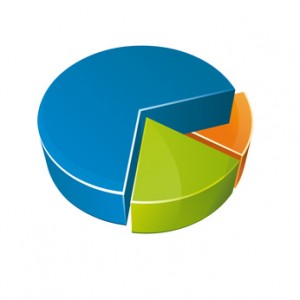This series of 3 minute math is designed as a quick reminder for some of the main topics. I hope they help to provide a focus and a way forward. If you need any more detail please search the site or contact me – always pleased to answer any questions!
All the very best with your studies.
Transcript from the video:

The first thing to know about adding fractions is that you need to make sure that the denominator, which is the number on the bottom, is the same for all the fractions in the sum. This makes it fairly straight forward. If you have something like:
you just simply add the two fractions together – so three plus one =
The next thing you need to remember is that, when you’re dealing with fractions, you need to make them as small as possible. In this example we can divide the top number by four and the bottom number by four:
giving us
.. and the answer to this question.
Now let’s say that the question that you’re presented with also has whole numbers in it. It might be something like:
all we need to do is add the two whole numbers together and we get seven. Next, we add . We then reduce this so that it becomes
.
When the denominators (which is the numbers on the bottom) are the same the sum is fairly straight forward. This time, we’ll consider:
We need to make the denominators the same.
To do this, I am going to convert them to something over twelve plus something over twelve.
Firstly, three times four is twelve, so therefore I multiply the top by four – four times two is eight. Next, four times three is twelve so I multiply one by three which gives me three.
Now I have
In terms of a typical exam paper you’re probably going to get something like:
The way to handle this is to add the two integers together (the whole numbers) which gives 9, then add the two fractions together and you get .
That’s pretty much all there is to adding fractions! The only other thing that you need to remember is occasionally you might use this method and you’ll end up with an answer something like:
This fraction just needs a little bit of tidying up and what we do is convert some of those elevenths into a whole number which gives us .
In a typical exam paper you’re more likely to get a fraction question with whole numbers and mixed denominators so you always need to make sure that the denominators are the same – in this particular case, we had twelfths.
I hope that’s been helpful and I look forward to seeing you inside the next three minutes.”
Watch video on YouTube – 3 Minute Math – Adding Fractions
Other posts that you you might be interested in:
Best you tuber kkkkk
I find this very helpful
thanks again!!
thanks so much ! I actually understand fractions now hahah
can you help me with 2 questions ive got please q1 one year the
farmer keeps 4200chickens. to supplement their diet she feeds the chickens
layers pellets. The recommended amount of this feed is 1 scoop of pellets
for every 12 chickens each day. On average one scoop contains 100 grams of
pellets.The pellets cost £6.50 for 25 kilograms. If she feeds her
chickens the recommended amount how much will it cost the farmer for the
layers pellets for this year.
the following year the farmer keeps fewer chickens the total costs for
these chickens for 1year are £295.00 for housing £45.00 for feed plus
additional expenses estimated at 15 % of the total cost for housing and
feed. During the year her chickens lay 14400 eggs which she packs into
boxes of 6. Based on housing feed and additional expenses what is the
estimated cost of producing 6 eggs in this year
Your great at explaining keep making videos!!
Hi – that’s great and thanks for the comment – really appreciated!
3 minute math is a good idea Simon. This was informative yet not rushed and not too long, well done 🙂 Always keen to learn more